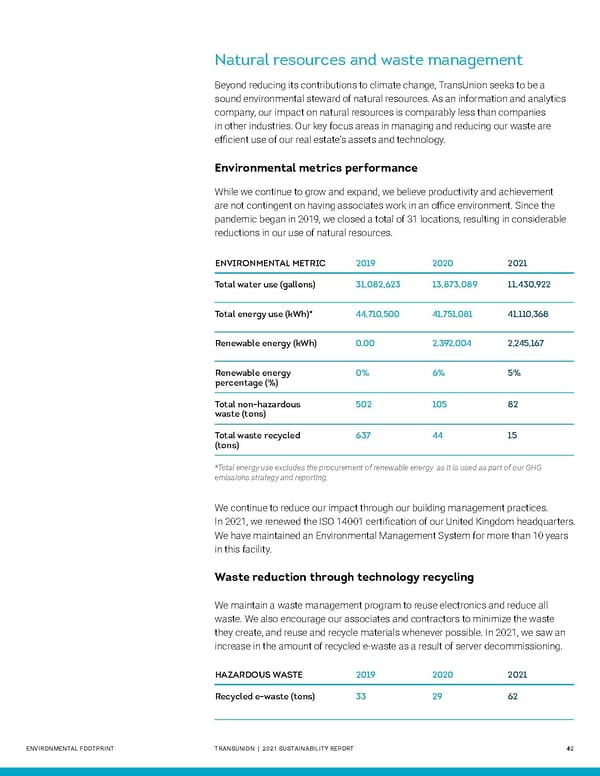Natural resources and waste management Beyond reducing its contributions to climate change, TransUnion seeks to be a sound environmental steward of natural resources. As an information and analytics company, our impact on natural resources is comparably less than companies in other industries. Our key focus areas in managing and reducing our waste are efficient use of our real estate’s assets and technology. Environmental metrics performance While we continue to grow and expand, we believe productivity and achievement are not contingent on having associates work in an office environment. Since the pandemic began in 2019, we closed a total of 31 locations, resulting in considerable reductions in our use of natural resources. ENVIRONMENTAL METRIC 2019 2020 2021 Total water use (gallons) 31,082,623 13,873,089 11,430,922 Total energy use (kWh)* 44,710,500 41,751,081 41,110,368 Renewable energy (kWh) 0.00 2,392,004 2,245,167 Renewable energy 0% 6% 5% percentage (%) Total non-hazardous 502 105 82 waste (tons) Total waste recycled 637 44 15 (tons) *Total energy use excludes the procurement of renewable energy as it is used as part of our GHG emissions strategy and reporting. We continue to reduce our impact through our building management practices. In 2021, we renewed the ISO 14001 certification of our United Kingdom headquarters. We have maintained an Environmental Management System for more than 10 years in this facility. Waste reduction through technology recycling We maintain a waste management program to reuse electronics and reduce all waste. We also encourage our associates and contractors to minimize the waste they create, and reuse and recycle materials whenever possible. In 2021, we saw an increase in the amount of recycled e-waste as a result of server decommissioning. HAZARDOUS WASTE 2019 2020 2021 Recycled e-waste (tons) 33 29 62 ENVIRONMENTAL FOOTPRINT TRANSUNION | 2021 SUSTAINABILITY REPORT 42
 Sustainability Report | TransUnion Flipbook Page 41 Page 43
Sustainability Report | TransUnion Flipbook Page 41 Page 43